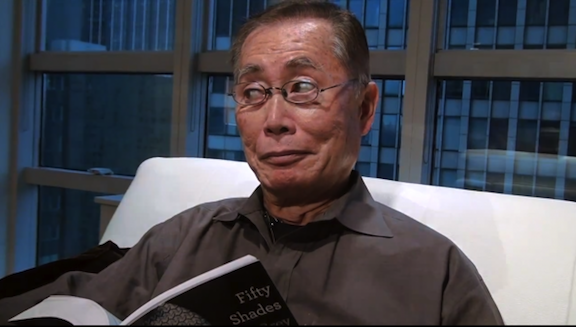To Be Takei documentarian Jennifer M. Kroot previously directed the documentary feature It Came from Kuchar, about the legendary underground filmmaking twins George and Mike Kuchar, which screened at SXSW in 2009. Kroot also wrote, directed, and starred in the gender-bending sci-fi narrative feature Sirens of the 23rd Century in 2003.
To Be Takei will debut at Sundance on January 18th.
Please give us your description of the film.
To Be Takei is a documentary portrait of the actor and activist George Takei. The film explores George’s life, from being imprisoned in Japanese-American internment camps as a child, to becoming a Star Trek icon, to coming out in 2005 and becoming an LGBT activist, and most recently reinventing himself as a social-media phenomenon. The heart of the film is following the functional-dysfunctional love story of George and his manager husband Brad.
What made you pursue this story?
I was always a fan of Star Trek: The Original Series. I was very intrigued and impressed with George when he came out in 2005 at age 68. He instantly became an LGBT spokesperson known for his quick wit and eloquence. I read his autobiography about being imprisoned in the internment camps as a child and I was compelled to reach out to him and try to make this film. It amazes me that George has faced (and continues to face) so many obstacles, but remains relentlessly positive, and has become a beloved icon in our culture as a result.
What was the biggest challenge in making the film?
George has led (and continues to lead) a very complex life, so I knew this film would have a rich, dense structure. It was a challenge to create the structure, especially with the range from very serious topics like the internment to lighter pop culture elements and even the outrageous comedy of George’s work on The Howard Stern Show. It was important to be able to switch moods quickly to reflect George’s personality.
What advice do you have for other female directors?
Try to look confident even when you’re not. Don’t be surprised if people underestimate you, and it doesn’t matter if they do.
What’s the biggest misconception about you and your work?
I think there can be a bit of a misconception about documentaries about art and pop culture. They are sometimes considered frivolous, but you can explore (subtly or explicitly) serious political, social and historical issues through entertaining and even humorous cultural subjects.
Do you have any thoughts on what are the biggest challenges and/or opportunities for the future with the changing distribution mechanisms for films?
I wish I knew! It is very confusing and challenging to try to figure out how distribution can change. Streaming has been terrible for filmmakers, but it’s not going to go away. I hope we can find a way to make it work better for filmmakers.
Name your favorite women directed film and why.
My favorite documentary directed by a woman is Paris is Burning by Jennie Livingston. It’s one of the most important and beautiful films ever made. Through the ball culture of New York in the 10980s, Livingston explores gender, race and class. The disenfranchised characters are unbelievably talented and so vulnerable.
My favorite narrative film directed by a woman is Titus by Julie Taymor. It gives me hope that women don’t have to direct “women’s films,” which usually means “boring,” but can direct violent, super-theatrical, sexy, dark, campy films too. The visuals in Titus are shocking, haunting and over-the-top.






